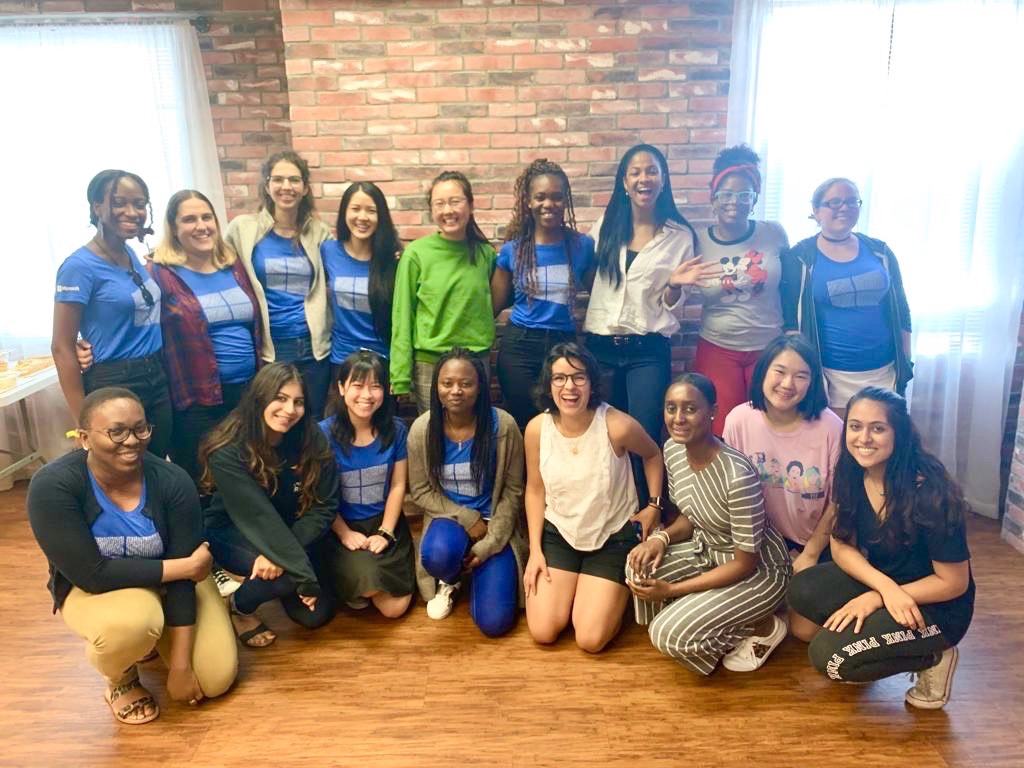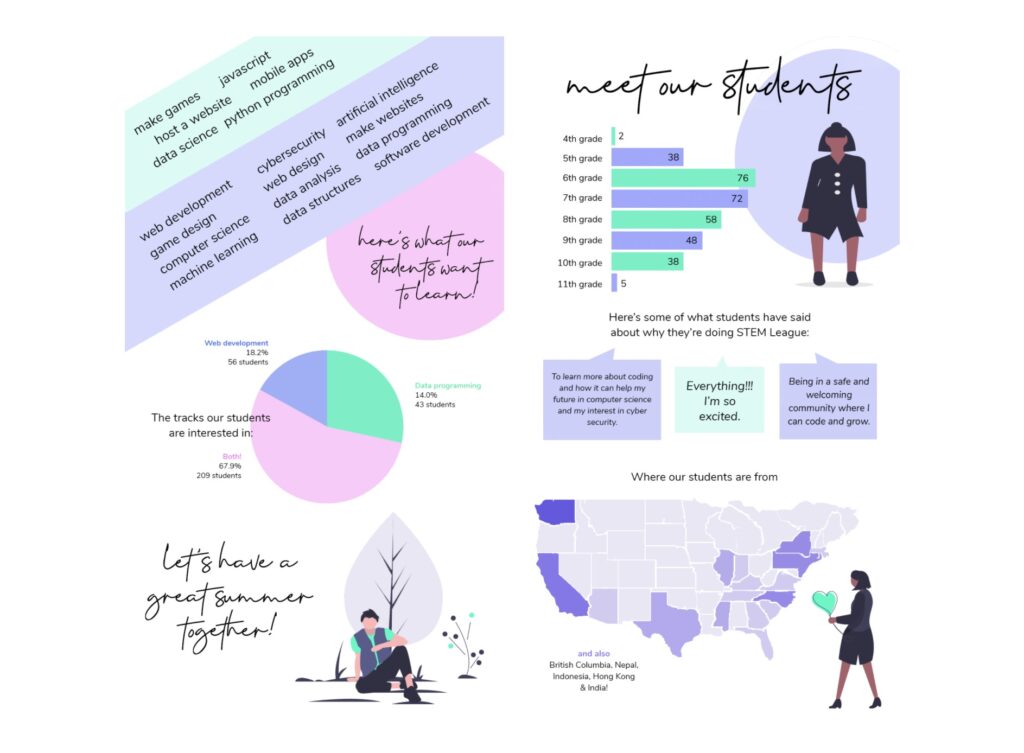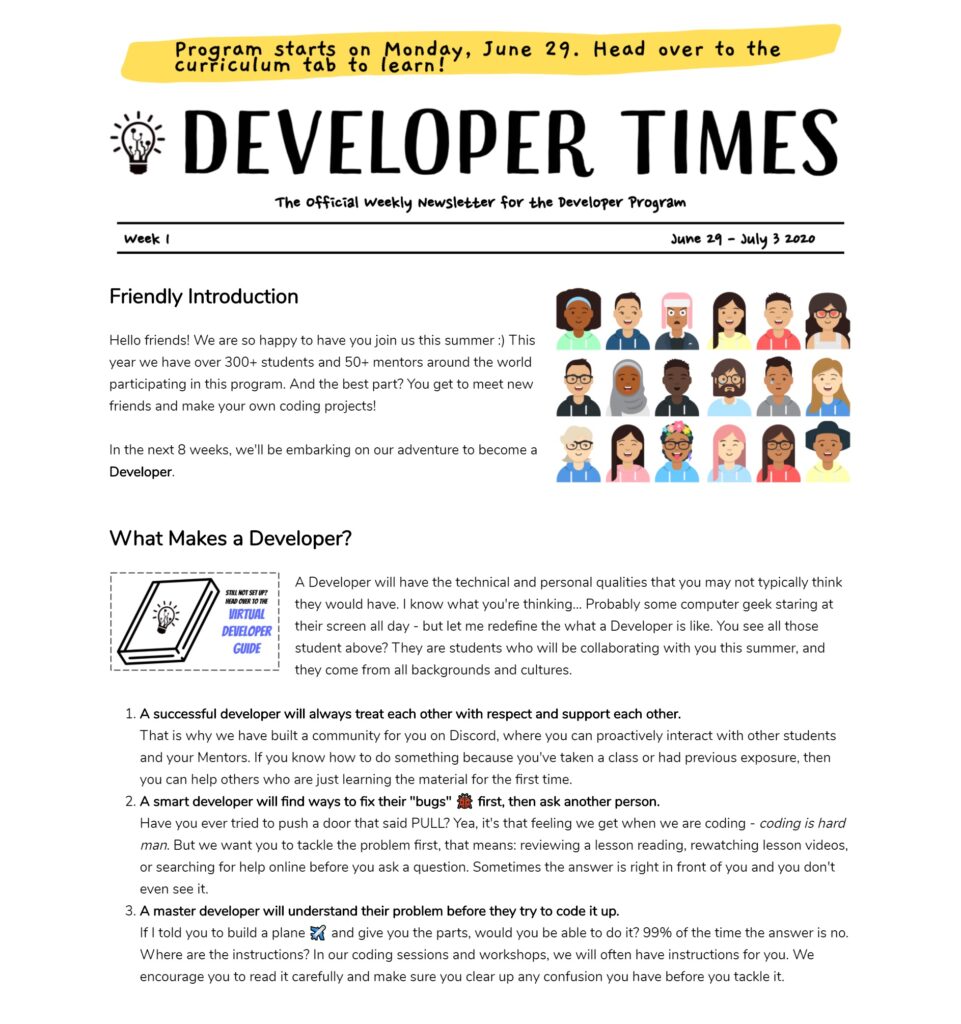Windows Insider article published on Nov 20, 2020

For Elizabeth Lin, one of our 2018 Grace Hopper Award winners and a computer science student at the University of Washington, her passion for learning has evolved into a passion for teaching. Her STEM League Developer Program taught coding to over 300 children around the world last summer. And she’s just getting started.
Finding her career path
Elizabeth got her first real taste of the field as a junior in high school when she attended Microsoft’s DigiGirlz, a free technology program for middle and high school girls to learn about careers in STEM.
But it wasn’t until a coding program with Google that she really started to be interested in computer science. “I initially wanted to do bio engineering when I started college, but I got into a little coding program,” she said. “It was at Google, where they took us through some different coding languages, and then make your own project, and I thought that was really exciting.” For her project, she built a web app that helped college students in Seattle explore their new city.
She loved how quickly she could turn insights into action, something you would’ve needed a laboratory for in bio engineering. “When you’re working in computer science, you can just easily grab the data and do some interpretation, and I thought that part was really cool,” she said. “So, I wanted to dive into computer science to learn a little bit more.”
Now in many of her computer science courses at the University of Washington, she’s a teacher’s assistant, which helped her realize how much she enjoys mentoring others. “As a first-generation college student, I believe I bring to the table the maturity to learn from my mistakes, the proactiveness to collaborate with others, and the confidence to be brave and supportive to others and myself,” she said.
Networking for a brighter future
This confidence helped her decide to apply for our Grace Hopper Award in 2018. “It was one of the best gifts, because it helped me align my career focus and discover a community of young women and mentors to share my stories and learn from them,” she said.

Not only was she able to attend the career fair and learning sessions at the Grace Hopper Celebration (GHC), but she also built relationships with the other winners and Microsoft employees. “The night I spent with 2018 Windows Insider Program attendees at the Microsoft Networking Night was an amazing experience,” she said. “I bonded with them and shared our diverse experiences into tech and really got to know each other and our goals for the future. Every moment of the 2018 GHC, I truly cherished because it was my first time having such a unique opportunity.”
She also joined this year’s digital Grace Hopper Celebration, where she was able to personally talk to other women early in their careers to learn about their industry experience and get their advice.Play Video
Elizabeth’s networking hasn’t stopped there either. In 2019 and 2020, she also joined Microsoft as an intern to take a deeper look at Windows Updates data, and when she comes back next year, she’ll be working on machine learning.
“If you don’t put yourself out there, if you don’t attend those career fairs or take the initiative to strike a conversation with others, they will never know you exist and that potential opportunity to learn and network will never be opened,” she said.
She credits this attitude as she looks towards growth and her future in the industry. “This was my mentality, and it helped me to overcome my imposter syndrome early in my college career,” she said. “And to this day, I am still following it to my best abilities.”
Teaching the next generation
Elizabeth’s love of learning and mentorship led to the accomplishment she’s proudest of. Her little sister had been looking forward to coding camps during the summer of 2020, but with quarantine, they were cancelled. Elizabeth offered to use all the time she was now spending at home to teach her, and as she started to plan fun projects and videos for her sister, she realized she could bring it to even more kids.
And so, her STEM League Developer Program was born. “I was so happy to see the project go from an idea I had during virtual school to an inclusive and free coding program for over 300 students,” she said.
Through the program, Elizabeth was able to leverage Windows to merge one of her personal tech passions of creating content with her technical knowledge to bring these children a great experience. “Windows is a platform to craft your projects and share your passions with others. For me, I love using Windows to create digital animations with PowerPoint and intermixing various technologies to create personal projects, like video editing and presentations,” she said. “Windows is also a platform to learn from others and build a supportive community.”
She used her own supportive community to make the program a success. “I recruited over 50 mentors where we worked as a team to develop the curriculum from our own diverse learning experiences,” she said.
Many of her mentors came from connections she’d already built and online communities she was already a part of. Even though she hadn’t known all of them before the program got started, they volunteered to give back to the next generation. Elizabeth believes these shared passions are key. “Build a community that has similar values and goals as you, because those are the people that will help guide you,” she said.
Together, they developed a full eight-week curriculum of videos, presentations, and special events, like a hackathon and pop culture themed weeks. They made the most of the same tools people have been using to work remotely, like video chat, to bring the students from around the world together to learn.
For their final hackathon showcase projects, kids who hadn’t known anything about computer science at the beginning of the summer were able to apply their new skills to their own passions. “Some made their own website to display their favorite music, create their own games, and display elaborate data visualizations about COVID-19,” she said. “I am proud that my Developer Program team was able to provide them the resources to be equipped with understanding how they can connect their newfound coding skills to real world applications to help them achieve their goals.”
As she looks at recreating it again this summer, she knows that she’s teaching these students more than just coding. “If you’re bad in math in high school, that shouldn’t indicate that you’re not going to major in a STEM-background in college,” she said.
“My goal for creating the Developer Program was to teach these students to be brave and confident about their abilities, stop comparing yourself to others, and just be yourself,” she said. “You are one of a kind, and you have the ability to shine just like everyone else in your own way.”
Original full design:



